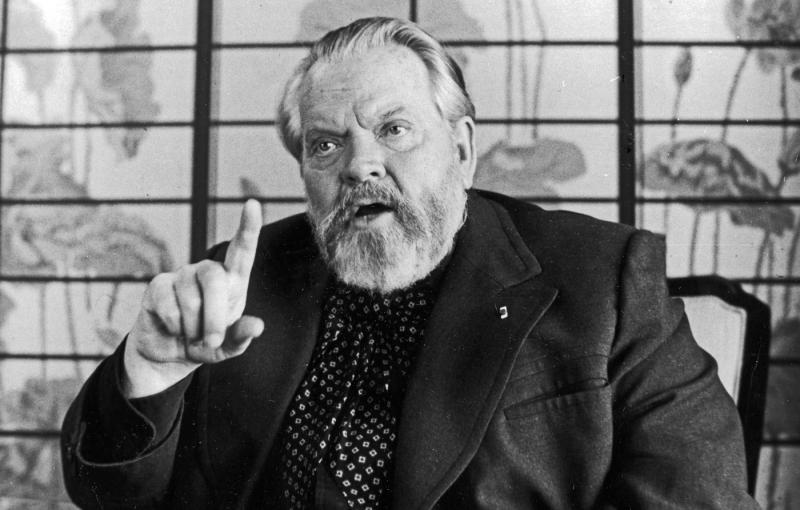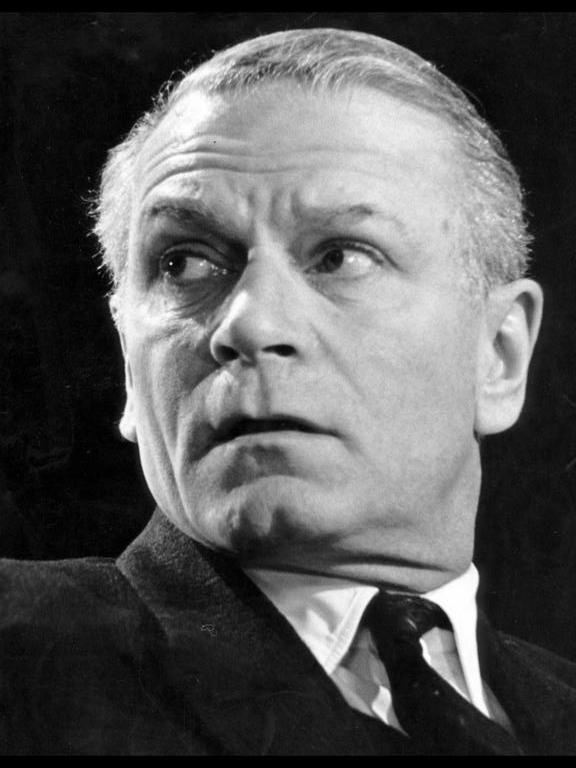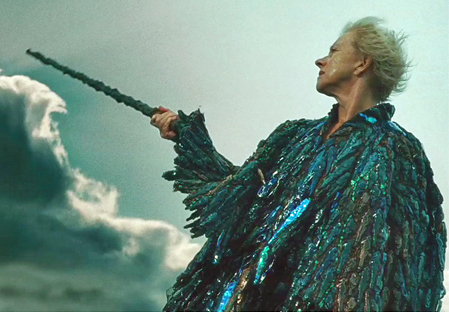Arena: All the World's a Screen – Shakespeare on Film, BBC Four | reviews, news & interviews
Arena: All the World's a Screen – Shakespeare on Film, BBC Four
Arena: All the World's a Screen – Shakespeare on Film, BBC Four
How the Bard has become part of our collective movie memory

In the last century, when the BBC took arts documentaries seriously, Arena was one of the highlights of the week. Nowadays its appearance is as rare as that of a Midwich cuckoo. Money, or rather the lack of it, is the problem. In our grave new world a single promo for EastEnders can cost more than a 60-minute film.
Three cheers then for Arena: All the World’s a Screen – Shakespeare on Film, a cavalcade of clips that show the Bard really is all things to all men. None of the talking heads belongs to a woman. None of the interviews is original, but David Thompson and Adrian Wootton have managed to take recycling to a new level and made 24-carat gold out of old footage.
 Hamlet has been adapted for the screen more than any other Shakespeare play. Besides Laurence Olivier’s version, which won four Academy Awards, it has been turned into an epic of Soviet realism by Grigori Kozintsev, an Italian western (Johnny Hamlet), and an exercise in neo-Noir by funny Finn Aki Kaurismäki (Hamlet Goes Business). Then there’s Romeo and Juliet which, in addition to West Side Story and Franco Zeffirelli’s ground-breaking 1968 production, has inspired Baz Luhrmann’s “cinematic tour de force” Romeo + Juliet and a Bollywood bonanza: “You’ve taken my breath away. I want it back” (Olivier, pictured right).
Hamlet has been adapted for the screen more than any other Shakespeare play. Besides Laurence Olivier’s version, which won four Academy Awards, it has been turned into an epic of Soviet realism by Grigori Kozintsev, an Italian western (Johnny Hamlet), and an exercise in neo-Noir by funny Finn Aki Kaurismäki (Hamlet Goes Business). Then there’s Romeo and Juliet which, in addition to West Side Story and Franco Zeffirelli’s ground-breaking 1968 production, has inspired Baz Luhrmann’s “cinematic tour de force” Romeo + Juliet and a Bollywood bonanza: “You’ve taken my breath away. I want it back” (Olivier, pictured right).
While all these films, to a greater or lesser extent, could be said to demonstrate poetry in motion (pictures), Zeffirelli disputes that it is the verse that has made Shakespeare the only global playwright. He attributes his appeal to the stories themselves, the emotional crises that transcend language. It is fascinating to see him rehearsing his teenage leads – surely the only time that an on-screen Romeo (Leonard Whiting) has looked good in tights.
As always Orson Welles looms large. Once again the chosen sequences fit the reminiscences perfectly: shooting Othello in a Moroccan bath-house; working round a micro-budget on Macbeth; playing Falstaff in Chimes at Midnight, his masterly cinematic conflation of the five plays that feature the huge hill of flesh.
However, the talking heads cannot compete with the clips from the movies themselves. The Technicolor pageantry of Olivier’s Henry V and the jaw-dropping visuals of Ran, Akira Kurosawa’s version of King Lear, contrast starkly with the recurring black and white images of blood, mud and death.
 It is wonderful to be reminded of Heath Ledger’s comic skill in 10 Things I Hate About You (based on The Taming of the Shrew); Leonardo diCaprio’s elfin beauty in Romeo + Juliet; Derek Jarman’s high camp, punkish (and freakishly faithful) re-imagining of The Tempest; and Helen Mirren’s brilliant performance as Prospera (pictured above) in Julie Taymor’s version of Shakespeare’s last great play. A comprehensive survey of the field, then. Ian McKellen (the king in Richard Loncraine’s 1930s Richard III) is conspicuous in his absence – "Out of my sight! Thou dost infect my eyes…" However, he can be heard delivering Prospero’s farewell speech.
It is wonderful to be reminded of Heath Ledger’s comic skill in 10 Things I Hate About You (based on The Taming of the Shrew); Leonardo diCaprio’s elfin beauty in Romeo + Juliet; Derek Jarman’s high camp, punkish (and freakishly faithful) re-imagining of The Tempest; and Helen Mirren’s brilliant performance as Prospera (pictured above) in Julie Taymor’s version of Shakespeare’s last great play. A comprehensive survey of the field, then. Ian McKellen (the king in Richard Loncraine’s 1930s Richard III) is conspicuous in his absence – "Out of my sight! Thou dost infect my eyes…" However, he can be heard delivering Prospero’s farewell speech.
Just as Shakespeare’s words have become a part of the English language, this excellent documentary suggests the films based on his works have become part of the collective movie memory. If this sounds highfalutin, the final clip is from Star Trek VI: The Undiscovered Country. Perhaps someone has already translated Hamlet into Klingon.
rating
Share this article
The future of Arts Journalism
You can stop theartsdesk.com closing!
We urgently need financing to survive. Our fundraising drive has thus far raised £49,000 but we need to reach £100,000 or we will be forced to close. Please contribute here: https://gofund.me/c3f6033d
And if you can forward this information to anyone who might assist, we’d be grateful.

Subscribe to theartsdesk.com
Thank you for continuing to read our work on theartsdesk.com. For unlimited access to every article in its entirety, including our archive of more than 15,000 pieces, we're asking for £5 per month or £40 per year. We feel it's a very good deal, and hope you do too.
To take a subscription now simply click here.
And if you're looking for that extra gift for a friend or family member, why not treat them to a theartsdesk.com gift subscription?
more TV
 Mr Scorsese, Apple TV review - perfectly pitched documentary series with fascinating insights
Rebecca Miller musters a stellar roster of articulate talking heads for this thorough portrait
Mr Scorsese, Apple TV review - perfectly pitched documentary series with fascinating insights
Rebecca Miller musters a stellar roster of articulate talking heads for this thorough portrait
 Down Cemetery Road, Apple TV review - wit, grit and a twisty plot, plus Emma Thompson on top form
Mick Herron's female private investigator gets a stellar adaptation
Down Cemetery Road, Apple TV review - wit, grit and a twisty plot, plus Emma Thompson on top form
Mick Herron's female private investigator gets a stellar adaptation
 theartsdesk Q&A: director Stefano Sollima on the relevance of true crime story 'The Monster of Florence'
The director of hit TV series 'Gomorrah' examines another dark dimension of Italian culture
theartsdesk Q&A: director Stefano Sollima on the relevance of true crime story 'The Monster of Florence'
The director of hit TV series 'Gomorrah' examines another dark dimension of Italian culture
 The Monster of Florence, Netflix review - dramatisation of notorious Italian serial killer mystery
Director Stefano Sollima's four-parter makes gruelling viewing
The Monster of Florence, Netflix review - dramatisation of notorious Italian serial killer mystery
Director Stefano Sollima's four-parter makes gruelling viewing
 The Diplomat, Season 3, Netflix review - Ambassador Kate Wyler becomes America's Second Lady
Soapy transatlantic political drama keeps the Special Relationship alive
The Diplomat, Season 3, Netflix review - Ambassador Kate Wyler becomes America's Second Lady
Soapy transatlantic political drama keeps the Special Relationship alive
 The Perfect Neighbor, Netflix review - Florida found-footage documentary is a harrowing watch
Sundance winner chronicles a death that should have been prevented
The Perfect Neighbor, Netflix review - Florida found-footage documentary is a harrowing watch
Sundance winner chronicles a death that should have been prevented
 Murder Before Evensong, Acorn TV review - death comes to the picturesque village of Champton
The Rev Richard Coles's sleuthing cleric hits the screen
Murder Before Evensong, Acorn TV review - death comes to the picturesque village of Champton
The Rev Richard Coles's sleuthing cleric hits the screen
 Black Rabbit, Netflix review - grime and punishment in New York City
Jude Law and Jason Bateman tread the thin line between love and hate
Black Rabbit, Netflix review - grime and punishment in New York City
Jude Law and Jason Bateman tread the thin line between love and hate
 The Hack, ITV review - plodding anatomy of twin UK scandals
Jack Thorne's skill can't disguise the bagginess of his double-headed material
The Hack, ITV review - plodding anatomy of twin UK scandals
Jack Thorne's skill can't disguise the bagginess of his double-headed material
 Slow Horses, Series 5, Apple TV+ review - terror, trauma and impeccable comic timing
Jackson Lamb's band of MI5 misfits continues to fascinate and amuse
Slow Horses, Series 5, Apple TV+ review - terror, trauma and impeccable comic timing
Jackson Lamb's band of MI5 misfits continues to fascinate and amuse
 Coldwater, ITV1 review - horror and black comedy in the Highlands
Superb cast lights up David Ireland's cunning thriller
Coldwater, ITV1 review - horror and black comedy in the Highlands
Superb cast lights up David Ireland's cunning thriller
 Blu-ray: The Sweeney - Series One
Influential and entertaining 1970s police drama, handsomely restored
Blu-ray: The Sweeney - Series One
Influential and entertaining 1970s police drama, handsomely restored

Add comment